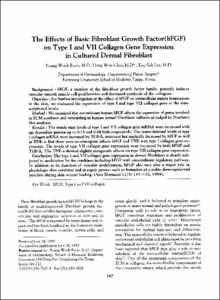The Effects of Basic Fibroblast Growth Factor(bFGF) on Type I and Ⅶ Collagen Gene Expression in Cultured Dermal Fibroblast
- Keimyung Author(s)
- Ryoo, Young Wook; Lee, Kyu Suk; Choi, Dong Won
- Journal Title
- Annals of Dermatology
- Issued Date
- 1999
- Volume
- 11
- Issue
- 3
- Abstract
- Background: bFGF, a member of the fibroblast growth factor family, potently induces vascular smooth muscle cell proliferation and decreased synthesis of the collagens. Objective: For further investigation of the effect of bFGF on extracellular matrix homeostasis in the skin,we evaluated the expression of type I and type VII collagen gene at the transcriptional levels. Method: We examined that recombinant human bFGF affects the expression of genes involved in ECM synthesis and remodeling in human dermal fibroblasts cultures as judged by Northern blot analysis. Results: The steady state levels of type I and VII collagen gene mRNA were decreased with age dependent pattern up to 0.13 and 0.44 folds respectively. The transcriptional levels of type I collagen mRNA were increased by TGF-β, treatment but markedly decreased by bFGF as well as TNF-α. But there were no synergistic effects bFGF and TNP-α on type I collagen gene expression. The levels of type VII collagen gene expression were increased by both bFGF and TGF-β,. The TNF-α showed slightly antagnostic effects on type VII collagen gene expression. Conclusion: The type Ⅰ and Ⅶ collagen gene expression in dermal fibroblasts is clearly subjected to modulation by the cytokines including bFGF with uncoordinate regulatory pathway. In addition to its function of vascular proliferation, bFGF also may play a major role in physiologic skin condition and in repair process such as formation of a stable dermoepidermal junction during skin wound healing. (Ann Dermatol 11(3) 147~152,1999).
- Publisher
- School of Medicine
- Citation
- Young Wook Ryoo et al. (1999). The Effects of Basic Fibroblast Growth Factor(bFGF) on Type I and Ⅶ Collagen Gene Expression in Cultured Dermal Fibroblast. Annals of Dermatology, 11(3), 147–152.
- Type
- Article
- ISSN
- 1013-9087
- Appears in Collections:
- 1. School of Medicine (의과대학) > Dept. of Dermatology (피부과학)
1. School of Medicine (의과대학) > Dept. of Plastic Surgery (성형외과학)
- 파일 목록
-
-
Download
 oak-aaa-00277.pdf
기타 데이터 / 507.43 kB / Adobe PDF
oak-aaa-00277.pdf
기타 데이터 / 507.43 kB / Adobe PDF
-
Items in Repository are protected by copyright, with all rights reserved, unless otherwise indicated.